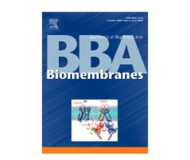

A work led by Dr. C. Vicenta Llorente Cortés, coordinator of the Lipids and Cardiovascular Pathology Group of the IIB – San Pablo and the CSIC, has been recently published in Biochimica et Biophysica Acta – Biomembranas. In collaboration with the Centre for Genomic Regulation (CRG) and within a RETOS-Collaboration project funded by MINECO and coordinated by Iproteos SL, the Lipids and Cardiovascular Pathology Group of the IIB Sant Pau demonstrates that peptides derived from a sequence of the LRP1 receptor are highly effective in inhibiting the pathological process of aggregation of LDLs that takes place in the vascular wall during the development of arteriosclerosis.
Recently, with LDL samples from participants in the SYSDIET and EQUATOR studies, Nordic authors have shown that the individual susceptibility of LDLs to aggregate is associated with future death from cardiovascular disease. Therefore, LRP1-derived peptides emerge as potential clinical tools in the control of LDL aggregation, prevention of atherosclerosis and future cardiovascular complications, particularly in patients with LDL prone to aggregation, such as obese and diabetic patients.
The research groups in Cardiovascular Biochemistry at IR-San Pablo, led by Dr. José Luis Sánchez-Quesada, and Proteinomic Design and Immunotherapy at UAB, led by Dr. Sandra Villegas, have also participated in the work.
You can consult the publication
https://www.sciencedirect.com/science/article/pii/S000527361930094X?via=- Proudly Presents